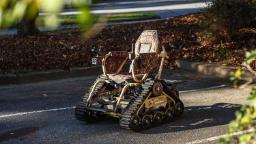[ad_1]

CNN
—
Wheelchair users will now be able to explore Georgia’s state parks with free all-terrain wheelchairs.
The new fleet of wheelchairs are part of a collaboration between the Georgia Department of Natural Resources and the Aimee Copeland Foundation, launched by Aimee Copeland, a social worker who in 2012 lost her both of her hands, one foot and most of one leg due to a rare bacterial, flesh-eating infection. The organization works to improve accessibility for disabled people, particularly through outdoor recreation.
“All Terrain Georgia is the pride and joy of Aimee Copeland Foundation,” said Copeland in a news release from the Georgia Department of Natural Resources. “It’s been a long time coming and we’re honored to offer this life-changing program to the community.”
The all-terrain wheelchairs allow wheelchair users to navigate more difficult terrain than they might be able to in an everyday wheelchair, according to the release. The chairs will be free with reservation at 11 state parks and historic sites in Georgia.
The new wheelchairs were unveiled at Panola Mountain State Park, southeast of Atlanta, on November 4. Users will need to reserve the wheelchairs in advance and also have a designated “buddy” with them at all times.
Georgia State Parks and Historic Sites Director Jeff Cown emphasized the importance of providing access to the outdoors for everyone in Georgia.
“Our mission is to provide outdoor opportunities for every Georgia citizen and visitor,” said Cown in the release. “I am proud to partner with the Aimee Copeland Foundation to offer access to visitors with mobility or physical disabilities.”
Georgia follows in the footsteps of Minnesota and Michigan, which have also introduced free all-terrain, electric-powered wheelchairs at their state parks.
Cory Lee, the writer of a blog focused on traveling as a wheelchair user, told CNN that he’s excited to explore Georgia’s state parks using the new chairs.
“It’ll open up a whole new world for me and for other wheelchair users,” he said.
He added that many of the Georgia state parks he has visited are “lacking in accessibility.”
“Some of them only have one accessible trail,” he said. “Now, there will be so many other trails that I’m able to do. I’m really looking forward to getting out on those trails soon.”
Lee added that state parks should still focus on adding more wheelchair-accessible routes if possible. Getting out of his everyday wheelchair and into the all-terrain wheelchair can be challenging.
Still, the all-terrain wheelchairs “are really a phenomenal resource,” he said.
Source link